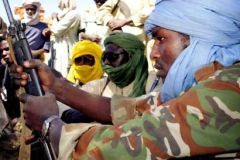Darfur rebels seize, then release 17 AU troops
By Opheera McDoom
KHARTOUM, May 12 (Reuters) – Darfur rebels abducted but later released 17 members of the African Union ceasefire monitoring force, the AU said on Wednesday, calling it a flagrant violation of ceasefire agreements signed by the group.

|
|
SLA rebels gather for a meeting with au monitors at Gellab, a village in the desert east of El Fasher, the capital of North Darfur state on November 8, 2004. (Reuters). |
In a separate development the World Food Programme (WFP) said two drivers contracted to deliver food in South Darfur had been killed in ambushes a few days earlier. The identity of the attackers was not known.
The AU said the 17 were detained on May 10 and released the same evening, but the force was unable to return to their base until the following day so as not to travel at night.
“The forceful detention of any AU personnel while performing their lawful duties is unacceptable and a flagrant violation of the commitments undertaken by the parties,” the AU statement said.
“The AU force headquarters have been instructed to take all necessary measures to prevent a recurrence and make it clear to all concerned that there will be consequences should similar incidents occur in the future.”
The rebel Sudan Liberation Army (SLA) said it had detained the 17 in South Darfur because a representative of the group was not with the AU patrol and the AU had not notified the rebels.
The AU said it did not need to notify any party that they were entering their areas. The troops were unhurt, they said.
The AU force of more than 2,300 soldiers and hundreds of civilian police are deployed in Darfur to monitor a shaky ceasefire agreed in April last year between mostly non-Arab rebels and the Arab-dominated government in Khartoum.
Tens of thousands have been killed in the violence and more than 2 million have been forced from their homes since the conflict began in early 2003.
The AU has come under fire on a number of occasions with one soldier shot in the neck in South Darfur earlier this year. The AU hopes to increase its force to around 12,000 by the first half of 2006 with an expanded mandate to protect civilians.
Under the AU mandate for its Darfur mission, investigation teams who document ceasefire violations should include an AU military observer, and a representative from each of the two main rebel groups and the government.
The AU did not say why the SLA representative was not on the patrol that was detained.
TRUCKS AMBUSHED
A senior U.N. official told the Security Council in New York on Thursday militias and rebels in Darfur have continued their attacks despite international efforts to stop the violence, and local authorities have stepped up their harassment of international aid workers in western Sudan.
WFP said in a statement two contracted trucks were ambushed on May 8 on a main road east of the capital of South Darfur state, Nyala and both Sudanese drivers were killed.
“Such attacks only make drivers extremely reluctant to transport food aid in Darfur and are making it very difficult to deliver enough food before the rains,” said Ramiro Lopes da Silva, WFP’s country director in Sudan.
“If we allow this status quo of violence and a general climate of lawlessness and insecurity to continue, we simply cannot reach all the people in need,” he said.
WFP estimates up to 3.25 million people in Darfur could be in need of food assistance during the rainy season in July and August, when many roads are rendered impassable.
WFP delivered food to 1.57 million in April despite ongoing looting of its vehicles, it said.
A U.S. embassy official in Khartoum said on Wednesday a U.S. photographer who was under house arrest in Nyala had been released without charge and left the country early on Wednesday morning.
Bradley Clift, who works for the Hartford Courant newspaper in Connecticut, had entered Sudan on a tourist visa and been arrested for taking photos without permits in displaced camps in Darfur.
Sudan requires journalists to obtain special visas to enter and has strict procedures for journalists to move around the country and work.
